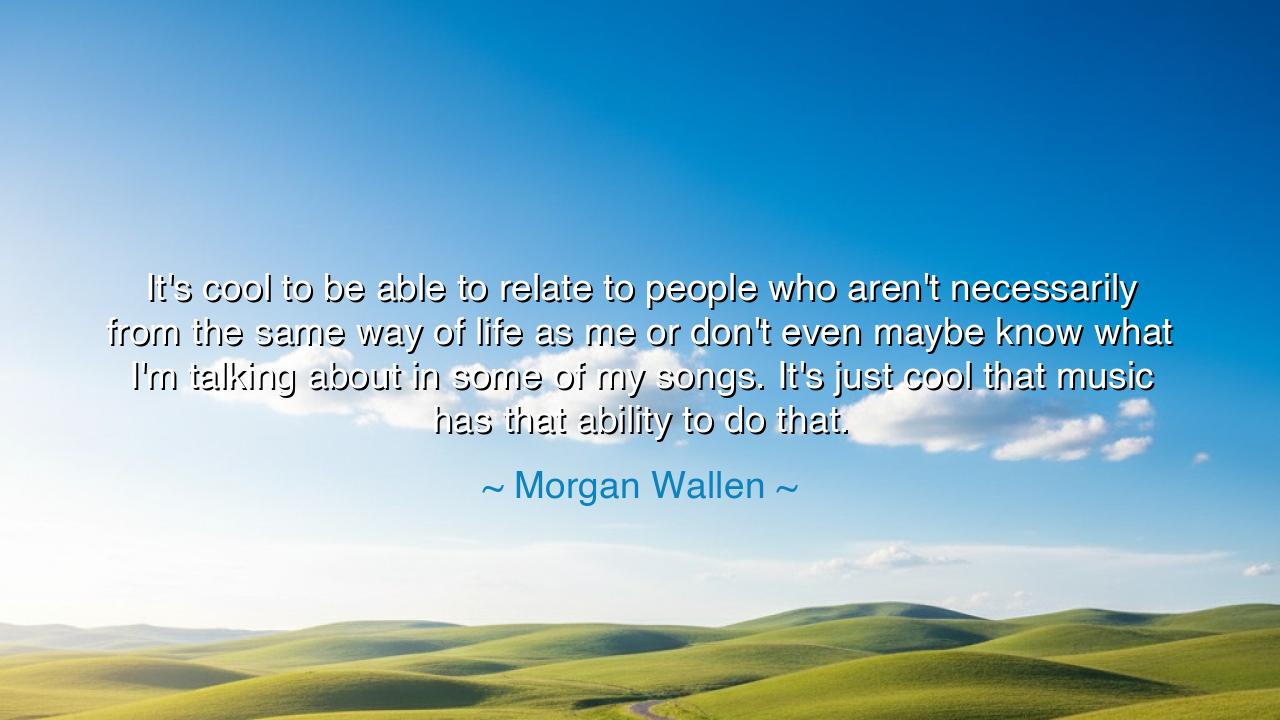
It's cool to be able to relate to people who aren't necessarily
It's cool to be able to relate to people who aren't necessarily from the same way of life as me or don't even maybe know what I'm talking about in some of my songs. It's just cool that music has that ability to do that.






The country singer Morgan Wallen, whose voice rises from the heart of small towns and open fields, once said with humble wonder: “It’s cool to be able to relate to people who aren’t necessarily from the same way of life as me or don’t even maybe know what I’m talking about in some of my songs. It’s just cool that music has that ability to do that.” Though these words appear simple, they hold within them an ancient and universal truth — that music is the language of the soul, a bridge between worlds, a current that flows beneath the differences of time, place, and life. What Wallen calls “cool” is, in truth, something sacred — the power of song to unite hearts that have never met, to make strangers feel like kin, and to remind humanity that we are all threads in the same eternal melody.
In the manner of the ancients, let us look not to the surface, but to the spirit beneath. When Wallen speaks of relating to people who aren’t from the same way of life, he honors the mysterious way that music dissolves the barriers we build between one another. A man from Tennessee can sing of dirt roads and heartbreak, and a woman from Tokyo, or Lagos, or Paris can feel her own memories stir within his tune. This is the hidden magic of art — that though our stories differ, our emotions are shared. The details of our lives may change, but the human heart beats to the same rhythm in every land. Thus, music becomes the great unifier, the silent teacher that whispers, “You are not so different as you think.”
The origin of Wallen’s insight lies in his journey through the ever-changing landscape of modern country music. Born in a small town, raised in the tradition of southern storytelling, he brought to his songs the rawness of his roots — stories of love, loss, and longing. Yet when his music spread beyond the borders of the American South, he discovered something profound: that people from distant worlds, who had never known the places or faces he sang about, still felt his songs as their own. They found themselves in his melodies, even if they could not share his roads. From this, he saw that art is not limited by geography, but by the depth of feeling it conveys.
This truth is not new. Consider the example of the ancient bards, the traveling poets who carried stories across kingdoms before written words bound thought to paper. In Greece, Homer sang of wars and heroes; in West Africa, griots told of ancestors and kings. Though their audiences spoke different tongues, all understood the yearning for glory, the pain of loss, the hope of redemption. Centuries later, a composer like Beethoven, who could no longer hear, wrote symphonies that would move people in every age and language. The tools change — the lyre, the drum, the guitar, the streaming app — but the essence remains eternal: music speaks to what is unspoken in us.
Wallen’s wonder, then, is not only about music, but about the mystery of connection itself. He stands in awe of how a song can reach beyond his own experience to touch lives he cannot imagine. In that awe, there is humility — the artist realizing that he is only a vessel for something greater than himself. For when he sings, the song no longer belongs to him; it belongs to whoever hears it and finds a piece of their soul reflected back. The act of creation becomes a shared experience — a communion between hearts across distance, culture, and time. This, truly, is the sacred gift of music: that it transforms loneliness into belonging.
O listeners of the world, learn from this truth: seek the bridges, not the boundaries. Whether through art, conversation, or compassion, strive to find the notes that harmonize rather than divide. When you speak, speak to the human spirit, not merely the surface of things. When you create, do not seek to impress, but to connect. For every person carries a song within them — and when your words, your art, or your kindness resonate with another, that is when the world becomes smaller, kinder, and more whole.
And so, let the lesson of Morgan Wallen’s words be sung from generation to generation: music reminds us that we are one. It is the language of the heart, older than speech, deeper than thought. The next time a melody stirs you, remember that you are sharing in something eternal — the same feeling that once moved kings and shepherds alike. Let that awareness humble you, soften you, and guide you. For in recognizing ourselves in one another through song, we remember the greatest harmony of all — that humanity itself is one vast symphony, and every soul is an instrument in its divine, unending refrain.






AAdministratorAdministrator
Welcome, honored guests. Please leave a comment, we will respond soon